There are two main ways to invest in real estate: buying property and investing in real estate trusts, also known as REITs. REITs allow you to invest in a diversified portfolio of properties without actually having to go out and buy them yourself.
Scroll down and read everything about REITs, from the different types of REITs to the risks and benefits associated with them.
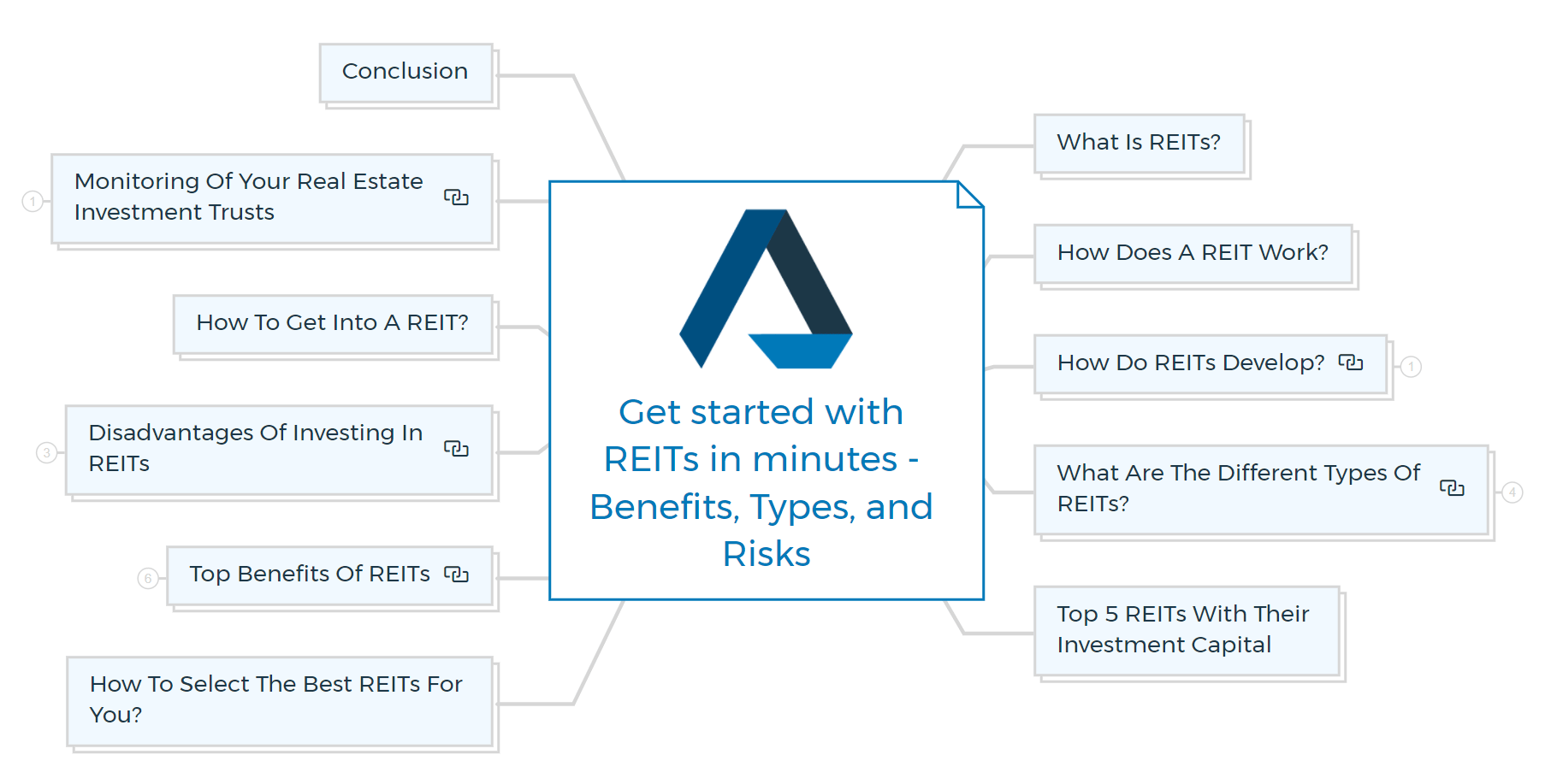
What are REITs?
REITs are real estate investment trusts. A real estate investment trust (REIT) is a company that owns, and in most cases operates, income-producing real estate.
REITs are created to offer a way for investors to invest in large-scale, institutional-quality real estate assets without having to directly purchase property.
Typically, REITs own and manage a portfolio of commercial properties, such as office buildings, retail centers, hotels, and apartments.
In exchange for tax breaks and other benefits from the government, REITs are required to distribute at least 90% of their taxable income to shareholders every year in the form of dividends.
This high level of dividend payout makes REITs attractive investments for income-seeking investors.
REITs own real estate, but when you buy a REIT, you are also buying a business.
REITs offer several advantages over buying property yourself. You don't have to be an expert in real estate to invest in REITs.
- All you need is some money to invest and a willingness to let someone else manage your money for you.
- Second, because REITs are traded publicly on stock markets, they offer liquidity (the ability to sell your shares quickly and easily) that most real estate investments do not.
- And finally, because it is an investment in a real estate property portfolio, REITs generally offer investors diversification benefits.
How does a REIT work?
A REIT functions as an exchange-traded fund. It owns various properties and may pay off depending on how the market performs.
- An investor will purchase REIT's shares.
- He will examine the REIT's performance in the market.
- The value of the REIT will fluctuate following the value of the trust's properties. The amount of change in value will differ.
- The investor will get dividend distributions. The size of these returns depends on the quantity of money invested.
The trust manager selects the properties for the portfolio and subsequently manages their upkeep, renovation, and rent collection. Investors, like you, purchase and sell units in the trusts through a stockbroker, just as they do with equities.
The exchange publishes trust prices in the same manner that average share prices are published, and they may be found on various online stockbroking sites and in daily newspapers.
Dividends, also known as distributions, are paid to investors every three to six months. Retail investors benefit from increases in the value of their properties since they own them.
Because the trusts do not pay taxes, they cannot grant franking credits, albeit there are numerous taxable income benefits of REITs to institutional investors.
How do REITs develop?
The United States, in 1960, established the first REITs. The concept was introduced to Australia by John Gandel in 1985 with Centro Properties Group, after which GPT group in 1986 and Westfield Holdings Ltd in 1987 followed the listing.
The Australian REIT investments market multiplied over the next decade. The number of trusts increased from three to more than 30, and property assets under management rose from $0.75 billion to $35 billion.
By 2007, there were 50 REITs on the Australian Stock Exchange with a combined market capitalisation of $60 billion.

Recent developments
The global financial crisis had a significant impact on real estate investment trusts. In the United States, many REITs' values fell by more than 50% from its peak in 2007 to its trough in 2009. In Australia, the value of REITs fell by approximately 40% over the same period.
However, since 2009, both the US and Australian REIT markets have recovered strongly. As of June 2013, there were 191 REITs on stock exchanges worldwide with a combined market capitalisation of US $783 billion (A$884 billion).
What are the different types of REITs?
There are three main types of REITs: equity REITs, mortgage REITs and hybrid REITs.
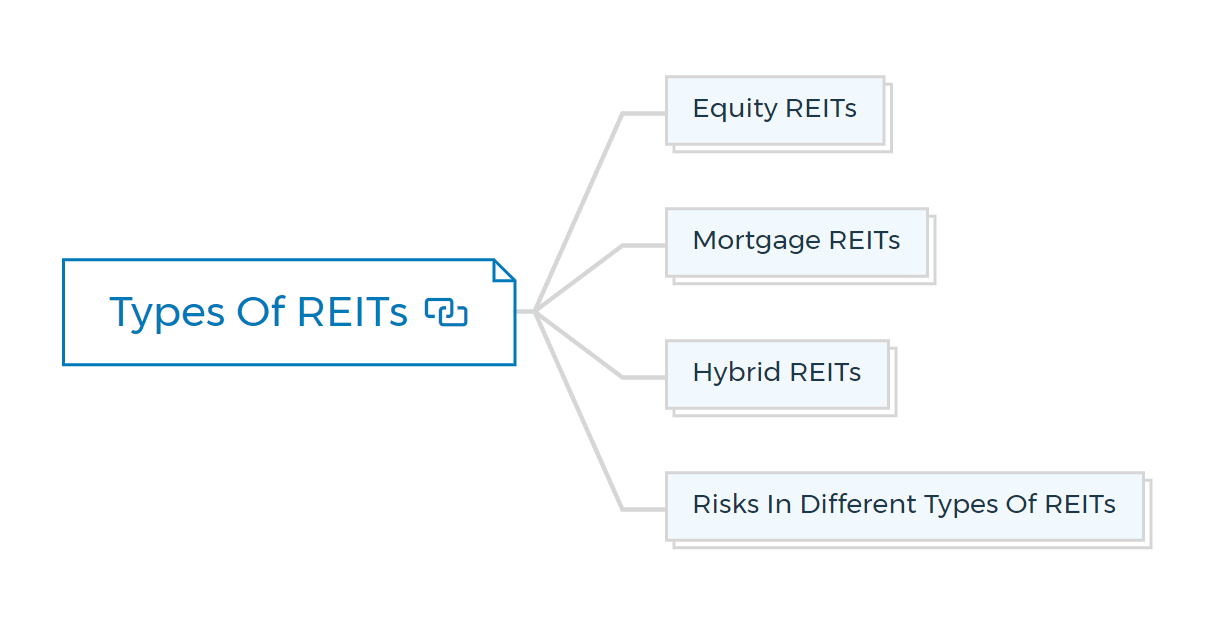
Equity REITs
Equity REITs own and operate income-producing real estate properties. They generate revenue from rents paid by tenants and other property-related income, such as parking fees, laundry services and concessions.
Mortgage REITs
These types of trusts invest in real estate mortgages or mortgage-backed securities. These REITs generate revenue primarily through the interest earned on these investments.
Hybrid REITs
Hybrid REITs are a mix of both equity and mortgage REITs. They typically have a higher dividend yield than pure equity REITs because they use leverage to increase their returns. However, this also increases their risk.
Risks in different types of REITs
Equity REITs are the least risky real estate investment trusts because they own income-producing properties. Mortgage REITs are riskier because they invest in mortgages and mortgage-backed securities.
These investments can be affected by changes in interest rates and the economy. Hybrid REITs have the highest risk since they use leverage to increase their returns. It also increases their vulnerability to market fluctuations.
Learn More
REITs vs Rental Property Investment
Rental property and REITS are the most common and profitable strategies to invest in Real estate. But which one is best between the two? It depends on your goal of investment.
Rental property
Rental properties are exactly what they sound like - you purchase a property and then rent it out to tenants. You're responsible for all aspects of the property, from finding and screening tenants to paying the mortgage and maintaining the property.
Usually, rental properties provide more rent to investors than what they are paying in mortgage, taxes, repairs.
REITS
REITs are a type of security that allows you to invest in a basket of properties without having to own or manage any of them yourself. REITs can add stability to your investment portfolio. These are publicly traded, privately traded or publicly non-traded.
Comparing REITs with rental properties is like comparing apples with oranges. With one. You will get direct ownership while with another you are owning shares in a company whose only goal is to own and run a portfolio of real estate assets.
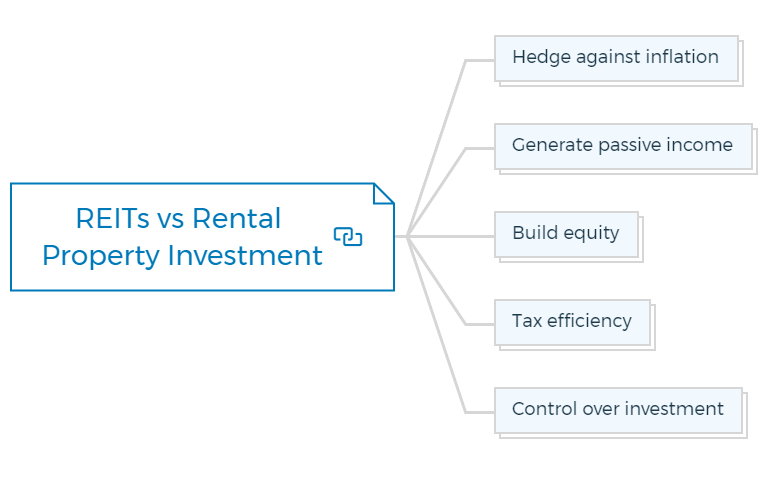
Hedge against inflation
Rental properties can be a great way to hedge against inflation. As rents increase, so does your income.
Generate passive income
If your goal is to generate passive income, REITs are a great option. The dividends they pay can provide you with a steady stream of income, and you don't have to worry about the day-to-day management of the property.
Build equity
Rental properties can appreciate in value over time, allowing you to build equity in the property. You can also use this equity as collateral for other investments or take out a home equity loan to access cash.
Tax efficiency
Investing in REITs or in rental properties both have tax advantages. At the trust level, REITs don't have to pay income tax, but a lot of their dividends are taxed as ordinary income.
But if you invest directly in real estate, you can deduct operating costs and depreciate the asset, which can cut your taxable income by a lot.
Control over investment
If you're the type of investor who likes to have complete control over your investments, then rental properties may be a better option for you.
Controls include which markets and assets to invest in, how much debt to use, whether to manage the property yourself or hire a professional property manager, and when to make capital improvements or sell properties.
REITs Vs Bonds
- Bonds pay a fixed amount of interest and have a set date when they must be paid off. On the other hand, REITs are productive assets that can keep growing in value forever.
- Though bonds offer higher yields than REITs, there is no growth potential for investors, they will only receive interest.
- If you're more concerned about keeping your money secure than making a profit, bonds are the way to go. The reason for this is that bond holders are assured of receiving their initial investment back when their bond matures.
- It's true that unlike bonds, REIT shares don't have a set maturity date and their value isn't guaranteed when sold. Bonds, on the other hand, offer no hedge against inflation, so you face a big risk that the dollar's value will go down.
Real estate investment trusts (REITs) tend to gain in value over time as the value of the underlying real estate rises and as rents from tenants increase over time.
REITs vs Stocks
Stocks are a type of investment that gives you ownership in a company. When you own stocks, you have the potential to earn dividends and capital gains.
REITs behave somewhat similar to stock in many ways.
- Investors buy shares to invest in a firm. The corporation can buy several things with investor funds. Similarly in REIT, investors also buy shares. The capital funds the company's real estate assets. This may involve buying, remodeling, managing, or maintaining properties.
- REITs are specifically for real estate based investments while stocks cover a wide range of categories which may or may not contain real estate.
- Like stocks, some REITs are high-risk investments that seek big gains, while others are low-risk picks that aim for steady returns with small gains. REITs do best when the value of the properties they own goes up. Stock prices, on the other hand, can be affected by a wide range of economic factors.
- Bonds, preferred stocks, and utilities are more affected by changes in interest rates than REITs.
REITs vs convertibles
Convertible securities are a type of security that can be converted into another type of security. For example, a convertible bond can be converted into shares of stock.
Convertible bonds and convertible preferred stocks are considered the direct competitors of REITs.
- These instruments offer yields equivalent to many REITs and appreciation potential if the common stock into which the convertible bonds or preferred stock can be converted rises significantly.
- Convertibles are appealing to investors because if the common stock fails to appreciate, convertible bonds have a fixed maturity date
- Good convertibles are hard to find because most companies don't offer them while REITs are always available. The investor who wants a high yield just has to keep an eye out for these hybrids. Once in a while, there is a small window of time when convertibles can be bought.
Top 5 REITs with their investment capital
Here are the top five REITs by market capitalisation.
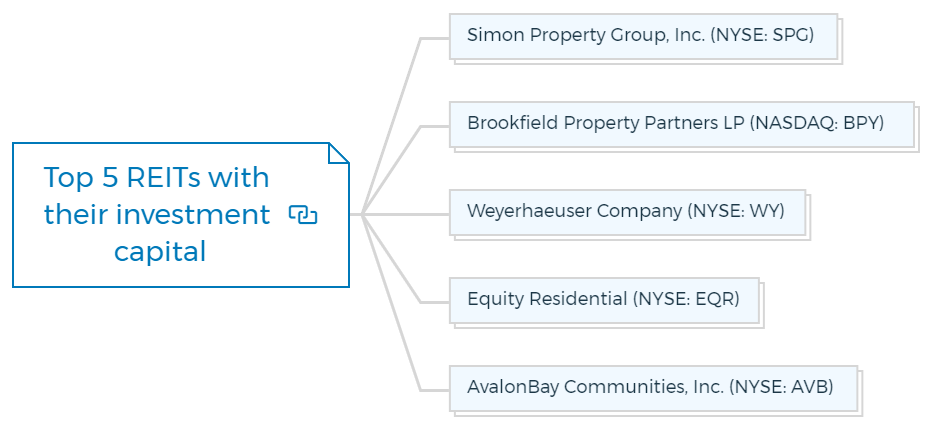
Simon Property Group, Inc. (NYSE: SPG)
A REIT that owns premier shopping centers, dining, entertainment and mixed-use destinations in North America, Europe and Asia. As of June 30, 2020, Simon owned or held an interest in 205 retail real estate properties in 36 states across the United States and Puerto Rico.
The company also owns 116 international properties located primarily in Europe and Asia.
Brookfield Property Partners LP (NASDAQ: BPY)
Next is Brookfield Property Partners LP (NASDAQ: BPY), one of the world's largest real estate investors.
Brookfield Property Partners owns a diversified global portfolio of real estate assets, valued at over $70 billion, including office buildings, retail, multifamily, industrial, hospitality and self-storage properties.
The company has interests in over 200 major capital markets across North America, Europe and Asia.
Weyerhaeuser Company (NYSE: WY)
A REIT engaged in the ownership and management of timberlands in the United States and Canada. Weyerhaeuser owns or controls approximately 23 million acres of timberlands in the US, with nearly 16 million acres in Washington state alone.
In Canada, the company owns or controls approximately 11 million acres of timberlands.
Equity Residential (NYSE: EQR)
It is one of the largest real estate investment trusts in the United States. Equity Residential owns or has interests in 302 properties, totalling more than 73 million square feet, across major metropolitan areas in 23 states and the District of Columbia.
The company's portfolio consists primarily of high-quality multifamily apartment communities that are well-occupied and have stable long-term occupancy rates and rent growth potential.
AvalonBay Communities, Inc. (NYSE: AVB)
It is a real estate investment trust engaged in the development, redevelopment, acquisition, ownership and management of multifamily communities throughout the United States.
As of September 30, 2020, AvalonBay owned 283 multifamily communities containing 84,479 rental units, including 12 communities under development containing approximately three thousand units.

Get The Edge Now!
Discover the transformative power of our FREE EDGE platform and
unlock a world of opportunities at no cost!

Your Real Estate Toolkit Awaits!
Free eBooks, Courses & Feasibility Suite Trial—Join Today!
✓ Unlimited FREE Trial: Experience the full power of our Feasibility Suite with hands-on demos
—explore without limits, no time pressure & without commitment or credit card!
✓ Learn from Success: Dive into real-life case studies for practical insights.
✓ Engage, Inquire, and Innovate: Ask questions, request features, and engage in lively discussions.
✓ Showcase Your Projects and Gain Insights: Share your projects and get personalised feedback.
✓ Free Resources Galore: Access a treasure trove of free resources,
eBooks & courses to keep you informed.
✓ Exclusive Training: Enjoy members-only training to sharpen your skills.
How to select the best REITs for you?
When selecting REITs, it's essential to consider your investment goals and risk tolerance. Some factors that you should consider are the geographic region where the REIT operates, the type of property it owns, and the company's size.
You must check the different commercial property types and strategies to invest in commercial real estate.
It's also essential to research a REIT's financial stability and management team. Make sure to review the company's track record and compare its dividend yield with other investments.
Finally, be sure to consult with a financial advisor to see if investing in a real estate trust is right for you. If it is, you need to decide which type of REIT you want to invest in.
Top benefits of REITs
The main benefits of listed property trusts and their popularity among small individual investors are that they are highly liquid. Also, they offer the opportunity to invest in a professionally managed portfolio of high-quality commercial real estate for a low entry fee, but they also provide a lot more.
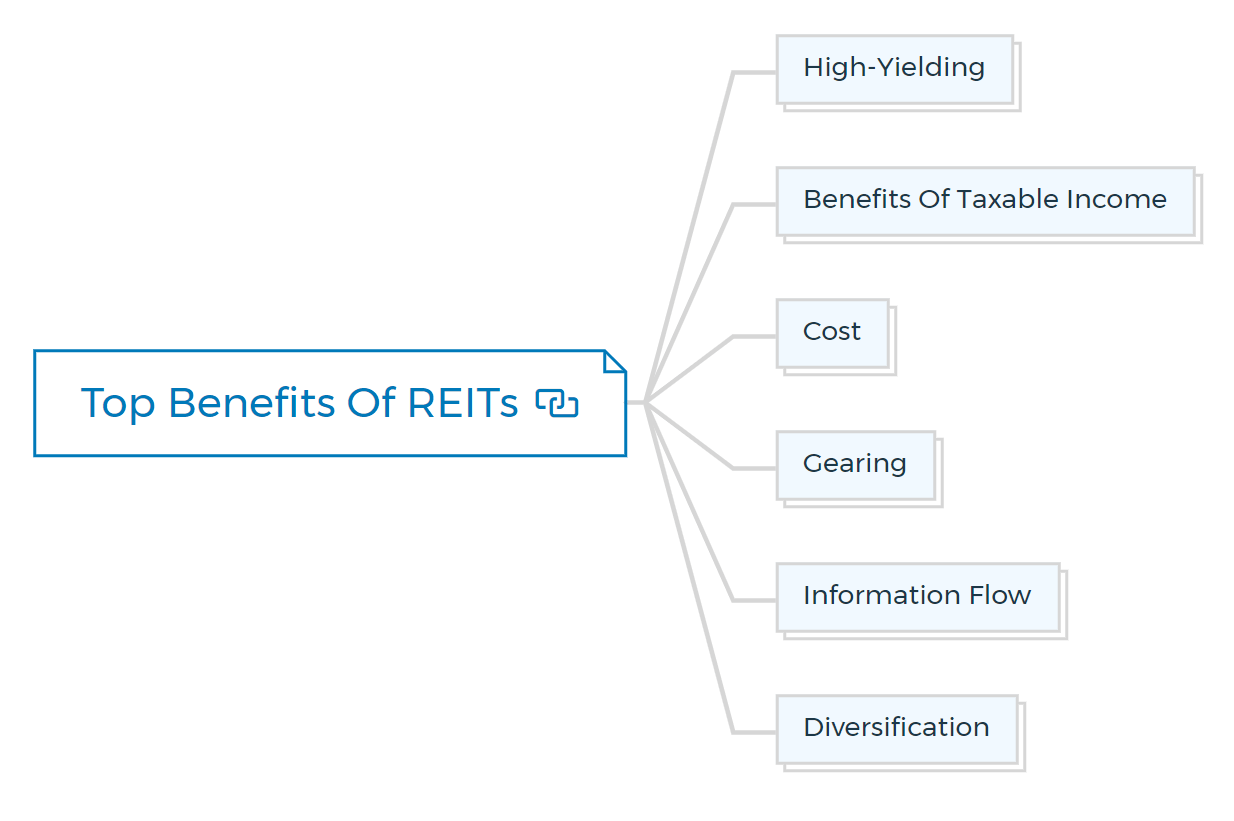
High-yielding
Historically, listed property trusts have delivered between 7% and 9% yields. It is higher than any other stock exchange sector and nearly doubles the overall market average. It also outperforms returns from residential real estate.
The high yields are because trusts distribute all of their profit to unitholders as distributions. They don't save profits for future investments.
Taxable income
Property trusts provide individual investors with a tax-advantaged portion of their distribution through depreciation allowances on their properties.
However, this taxable income benefit is not always as beneficial to investors as franking credits connected to stock dividends. Due to various tax deductions, there is also a tax-deferred component.
This component may account for up to 100% of the entire distribution. Investors do not pay tax on this component of the pay-out until they sell their trust units, at which point they pay tax at the concessionary capital gains rate.
Cost
Property trusts can be purchased for as little as $1000 or even less, though broking fees might make such a tiny investment unprofitable.
Gearing
Following a slow start, most trusts have taken advantage of Australia's low-interest rates to build their holdings with borrowed funds in recent years.
In the early 1990s, high debt levels contributed to the demise of several trusts, resulting in an average gearing ratio of approximately 5% by 1996. However, other investment funds now have gearing ratios of around 35% due to increased borrowings.
Debt management abilities are becoming more crucial in the trust industry, as borrowings allow managers to purchase more and better properties and diversify their portfolios.
However, there is concern that low-interest rates will encourage trust managers to borrow to achieve growth—and hence increase their management fees—by allowing them to acquire properties of worse quality.
It comes when the industry is complaining about a lack of high-quality large properties in Australia. The capacity to obtain returns higher than mortgage rates has been a critical component in property trusts' recent outstanding performance.
However, if interest rates rise, this could be a negative.
Information flow
There is a wealth of information about the leading trusts. Each trust must issue a PDS and present an annual report because they are on the stock exchange.
Furthermore, because most REITs are such a significant component of the stock market, broking houses regularly prepare sector analyses and reports for their clients.
Several independent information companies provide regular industry research, mainly for the benefit of financial advisors, but anybody can access their content.
Diversification
While some trusts invest in just one or two buildings, most do so across a portfolio. It gives small investors access to various properties while protecting them if they have problems.
It distinguishes them from property syndicates, which typically invest in just one, or occasionally two or three, properties.
Disadvantages of investing in REITs
Property trusts, on the other hand, have some drawbacks.
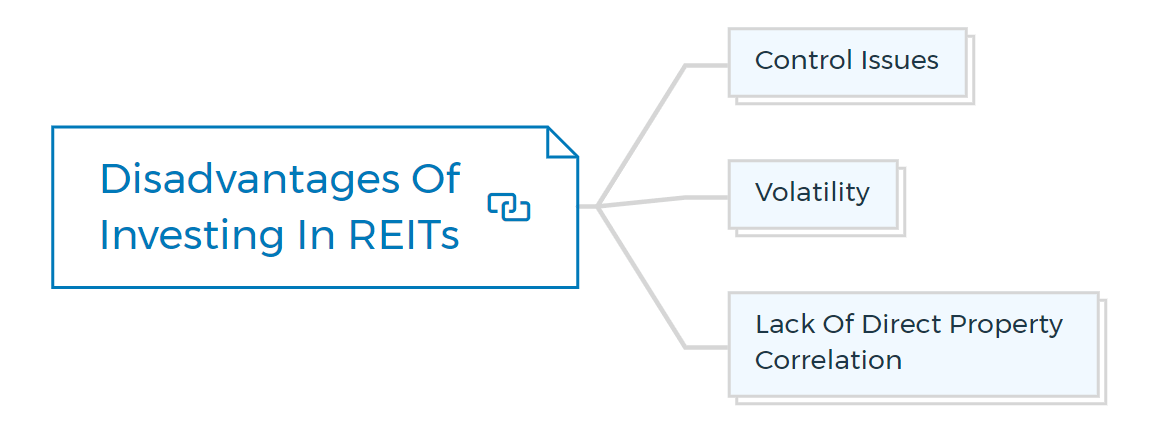
Control issues
You will have little say in the trust's management as a small investor. The majority of investors want no control at all. However, the trust managers may choose to buy a property you dislike or sell a property you think they should keep.
Or they might do something else that you find offensive. You won't be able to do much about it. The management of public corporations does not always function in the best interests of shareholders.
Volatility
Listed property trusts are less volatile than most stocks, although more volatile than direct property investment. It can benefit the astute investor, who may be able to purchase a trust just as the share price begins to rise.
However, it may be possible to buy just before the price enters a protracted period of dormancy. It is dangerous for small investors, who frequently purchase shares garnering media attention and have already achieved their peaks.
Property trusts are more hazardous than direct property investments because of volatility. Nonetheless, property trusts' high liquidity allows them to exit the transaction swiftly if something goes wrong, which is not always the case with direct property.
Lack of direct property correlation
Investors buy property trusts to obtain exposure to commercial real estate, but the trusts' share prices do not always move in lockstep with property prices.
Property trusts are similar to stock market investments, and market conditions heavily influence their performance.
When the government decides to pump liquidity into the economy by decreasing interest rates, it can instantaneously and positively influence the market, including the trusts, while taking a long time to trickle down to actual property values.
Investors looking for a haven when other stock market assets appear risky may purchase the trusts. The link between property values and the gross income is frequently shaky for all of these reasons.
How to get into a REIT?
You can contact someone to assist you with the procedure once you've decided on the REIT you want to invest in.
There are a few steps to follow:
- If you're interested in joining a REIT, speak with an investment broker.
- Examine all of the REIT's terms and conditions. These include any fees incurred and how the trust may evolve.
- Talk to your broker about how the REIT is doing and what kind of return you might expect. The broker should go through everything with you and show you how it can benefit your investing strategy.
- Determine how much money you want to put into the REIT in total. After transferring your cash into the trust, REIT will officially include you.
It is a simple procedure that requires little effort on your part. If you don't have the funds to invest in real estate more traditionally, joining a REIT might be gratifying and worthwhile.
You'll need to verify your identification and deposit funds into the trust. You may also need to meet with an advisor who can provide detailed information about the trust's risks and other aspects.
Potential investors should ask the following questions before investing in REITs:
- What is the condition of the underlying real estate assets?
- What is the trust manager's track record and ability to add value?
- How stable is the cash stream (the lease terms and rent review details, for example)?
- What can I expect from my LPT investment in terms of returns?
- What are the risks associated with a specific LPT investment?
- Is the current market mood in favor of this LPT's price?
- Is the market in an uptrend, consolidating, or declining right now?
Purchasing shares in a publicly-traded property trust is simple. All you need is a brokerage account and the ability to make an order. Of course, you'll have to pay a stockbroking fee.
As a result, placing an order for less than $1000 would not usually be considered cost-effective. For example, if you bought $500 worth of stock, you'd need a 6% return to recoup a $30 brokerage charge.
You will receive REIT dividends typically twice or four times a year. Increasingly, firms are issuing a yearly statement to help you with tax preparation.
Some trusts provide a distribution reinvestment plan, allowing you to reinvest your pay-out in new units at a slight discount to the current market price without paying any brokerage fees.
The trust manager gets paid a proportion of the total assets. It usually amounts to about 0.5 per cent of the assets. If the trust's shares meet a specified benchmark, some trusts may have a provision that pays the managers a performance fee.
Some trusts are part of a stapled securities structure, in which investors possess both trust units and shares in a different asset. The latter security is usually a funds management firm administering the trust and its assets and other development operations.
It is not possible to trade the units and shares separately. Investing in trusts with a stapled security attached has a higher risk, but it can also yield more significant rewards.
Monitoring of your real estate investment trusts
The Australian Stock Exchange divides all listed businesses into sectors using the Global Industry Classification Standard (GICS) developed by Standard & Poor's and Morgan Stanley Capital International, the two largest providers of stock index services in the world.
GICS aimed to make investment research and management easier for financial professionals worldwide. And also to make sector analysis and investing easier on a global scale.
The financial sector in other nations includes property trusts. On the other hand, property trusts classify as a separate asset class from the equity in Australia, with lower gearing levels than elsewhere in the world.
UBS-Warburg Australia, a stockbroking firm, publishes a lot of research on the industry and creates six sub sector indices, including trust leaders, diversified trusts, retail trusts, commercial (office space) trusts, and industrial properties and hotel trusts.
Other brokerage firms create their property trust indices.

REITs futures
A new type of real estate investment trust has emerged in recent years - the real estate investment trust futures. These futures contracts allow investors to bet on the future performance of a REIT index, such as the S&P 500 Nareit Index.
To trade REIT futures, you first need to open an account with a broker that offers these contracts. Then it would help if you decided which contract to buy. There are three types:
- The front-month contract is for the current month's settlement price.
- The next-month contract is for the following month's settlement price.
- The far-month contract is for the expiration date several months in the future.
Once you have decided on a contract, you need to decide how much money you invest. The minimum investment is usually $500, but it can be higher depending on the broker.
Then you place your order with the broker and wait for the contract to expire. If the REITs index ends up higher than the settlement price, you make money. If it ends up lower, you lose money.
Conclusion
REITs offer a unique way to invest in the real estate market. They can provide high returns and come with a certain amount of risk. Before investing in a real estate trust, be sure to consult with a financial advisor and do your research to find the right one for you.
If you're interested in trading REIT futures, remember that they are a high-risk investment and perform them only with the help of experienced investors.
REITs can be a great addition to your investment portfolio if you are looking for exposure to the real estate market without having to purchase property directly. However, it is essential to understand the different REIT types and the risks involved before investing.
With a bit of research, you can make an informed decision about whether or not a real estate trust is suitable for your investment portfolio.
Happy investing!
FAQs

